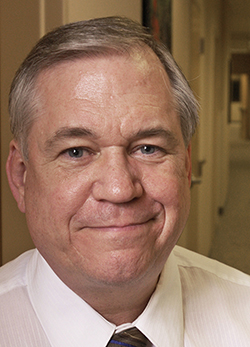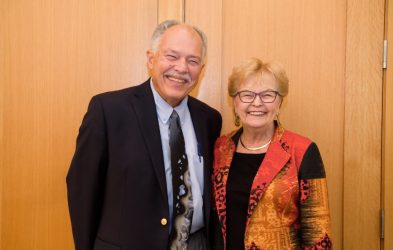To commemorate the 20th anniversary of implementation of the Oregon Death with Dignity Act, we are featuring stories of those who in 1997 campaigned against the repeal of the law adopted by Oregon voters 3 years before. Today we are publishing a letter from Physicians for Death with Dignity, which in 1997 was “by far the largest physician group in the country to support aid in dying,” to medical professionals across Oregon. In the letter, the leaders of the group, organized by our predecessor organization, the Oregon Death with Dignity Legal Defense and Education Center, urge their colleagues to oppose Measure 51, the 1997 ballot measure to repeal the law. Additionally, we have included responses to the letter from doctors and pharmacists who voiced their support for the nation’s first assisted dying statute.
Other installments in the series:
- 20 Years of the Oregon Death with Dignity Act
- “A Better Way”: George Eighmey’s Journey Toward Death with Dignity Nationwide
- “We Never Gave Up”: Geoff Sugerman on Campaigning for Death with Dignity
- From the Archives, 1997: In Letters to Lawmakers, Oregonians Voice Support for Death with Dignity
- “A Last Loving Gift”: Nora Miller on Grief, Advocacy, and the Right to a Dignified Death
- “Everyone Should Have This Option”: Jan Rowe on her Family’s Commitment to Death with Dignity”
In 1997, our predecessor organization, the Oregon Death with Dignity Legal Defense and Education Center (ODLDEC) assisted the Oregon Right to Die political action committee’s campaign against Measure 51, which would have repealed the Oregon Death with Dignity Act passed by voters three years prior. In July 1997, under the leadership of Professional Education Director, Peter Goodwin, MD, ODLDEC facilitated education programs aimed at doctors. Together, they organized the medical community around the implementation of the law by forming Physicians for Death with Dignity, “by far the largest physician group in the country to support aid in dying.”
The Center kept Oregon doctors informed about the fast-moving developments and invited them to take a public stand for death with dignity, with more than 30 education events featuring supportive doctors.

The late Peter A. Rasmussen, MD, was a founding member of Physicians for Death with Dignity. Andrea J. Wright / Statesman Journal
After the election, with the law in place, the Center set up a network of physicians to serve as referral resources for doctors opting out of the law.
Our archives contain physical copies of letters sent to Oregon doctors by Physicians for Death with Dignity, as well as the response cards sent to ODLDEC by supportive doctors. Below are excerpts from a letter and a sampling of responses from medical professionals across the state.
Excerpts from Physicians for Death with Dignity letter, August 1997
Dear Colleague:
Do you believe that Oregon citizens who are competent and terminally ill should have the option to consider a hastened death? If so, please join us in support of this medical option.
As you know, the 1997 Oregon legislature voted to place the Oregon Death with Dignity Act (1994’s Measure 16) back on the ballot for another vote in November, 1997. This unprecedented referral was the result of the intense lobbying efforts of the Oregon Catholic Conference and Oregon Right to Life. During days of hearings, meant to determine if modification of the Act was necessary, the Legislators chose to ignore the advice of experts in the medical field and Governor [John] Kitzhaber, a physician as well; instead, they turned their backs on the majority of Oregon voters who passed this legislation in 1994.
One of the major justifications used by legislators hostile to physician aid in dying was that the Oregon Medical Association (OMA) had voted to abandon its neutral stand and oppose the law. As you well know, this reversal came about as a result of a campaign by vocal physicians with dogmatic religious views. The House of Delegates vote, however, does not reflect the beliefs of the majority of Oregon physicians who care for the terminally ill, 60% of whom are of the opinion that physician aid in dying should be legal. …
We urge you to return the enclosed response card showing your support for the right of patients to make their own end-of-life decisions.
Physicians for Death with Dignity
Sampling of responses:
“Death with Dignity does not mean physicians will be killing patients, or are supposed to end life. It means patients have a choice. It also does not preclude increased awareness and education around pain control.
We can have both increased understanding of pain control and death with dignity.
“I am ‘furious’ with the O.M.A. for expressing the opinion of Oregon physicians without polling them: I think it is for the physicians who want to implement the wishes of the members of the public who want a death with dignity. If somebody wants to die any other way more power to them.”
“Be prepared for a vicious battle. The Religious Right has determined to make Oregon the major battle ground on the issue. They have lot of $ & will spend them on T.V.”
“This reflects my personal opinion, not that of my employer. Thanks for doing this, I’m disappointed by the position of many of my colleagues who seem to be driven by fear rather than compassion.”
“Thanks for the chance to participate in this discussion. Here’s a small contribution to defray expenses.”
“I personally am willing to participate in patient’s right to die under certain circumstances. However, my company has taken a stand against it, and informed us in January that we are not allowed to participate. If there is any influence you can have over this, _____[name withheld] is the one to call.”
“I do not believe my “knowledge base” is adequate enough to act on the network as a consultant. Hopefully this will change through efforts of your organization and as we all gain experience under this “brave new law”.
Featured image: Eli Stutsman (left) with Dr. Peter Rasmussen, MD, in front of the US Supreme Court in 2003.


One comment.
DONNA M GROSSO
How dare anyone think that it is okay to decide such a personal decision for any patient that is of age. We believe that even if NOT TERMALLY ILL, any person or patient has the right to avoid being put in a home to suffer loneliness and cruelty by a care giver that does not really care. We all can try to fool ourselves and say that Nursing homes are wonderful. They are not! Of course there are some better than others, but unless you’ve lived this nightmare, no one should assume things are great for the elderly once they are no longer in their home being cared for with direct family care. And sometimes, family care can also be a nightmare for the elderly. Either way, their has to be total protection for the rights of each adult person that may be facing the unknown.
If a person is no longer able to have what He or She feels is a quality of life in their standards, they should be able to make plans to leave this earth in anyway they feel would relive them from the anguish they live day in and day out, not knowing what will happen to them. Remember we will all be in this position one day. Don’t you want to have the right to go peacefully with good solid memories filled with love, laughter and happiness? The unknown is the most uncomfortable state of mind for anyone of any age. Shame on you if you don’t pass this bill State wide/ and eventually Country wide.
Comments are closed.